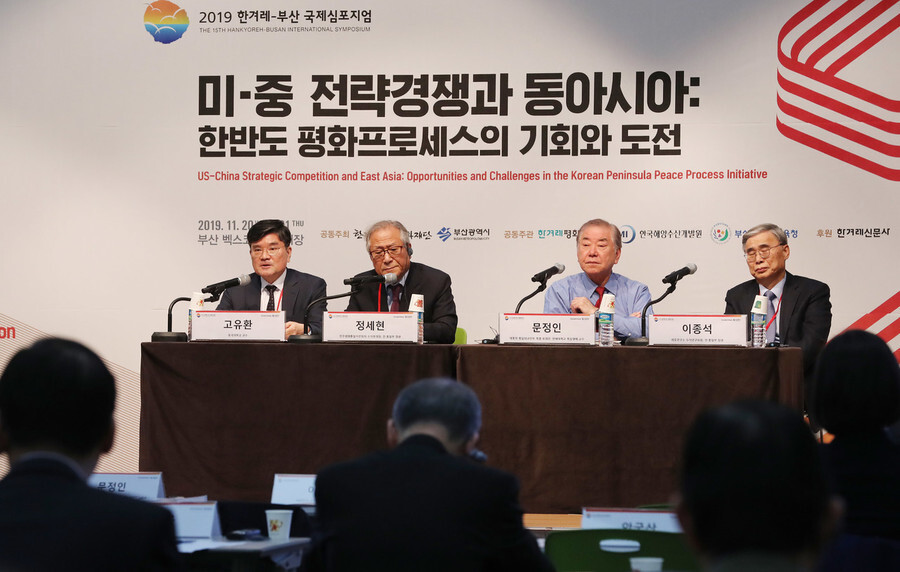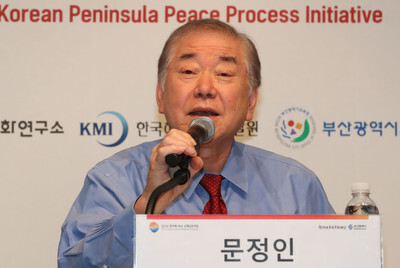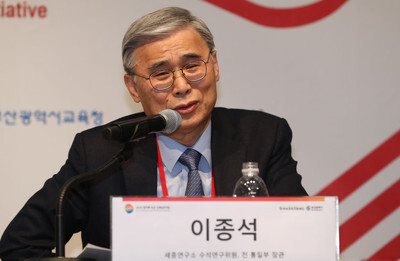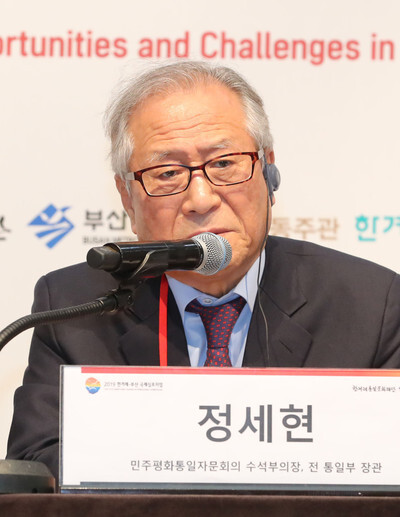hankyoreh
Links to other country sites 다른 나라 사이트 링크
A talk on how to warm the chill in N. Korea-US relations

How can the heated debate between North Korea and the US over the end-of-the-year deadline for their negotiations be resolved? And what about the chill in inter-Korean relations? These were some of the questions that came up during a candid and vigorous 120-minute debate about the lingering remnants of the Cold War on the Korean Peninsula and about the challenges facing the peace process during the Hankyoreh-Busan International Symposium, held on the afternoon of Nov. 20.
The participants in the debate were Moon Chung-in, special presidential advisor for unification, foreign affairs, and national security; Lee Jong-seok, senior analyst at the Sejong Institute and former unification minister; and Jeong Se-hyun, executive vice chair of the National Unification Advisory Council.
Obstacles to ending the Cold War on the Korean PeninsulaJeong Se-hyun: The problem is the mismatch between the North Korean policies held by the South Korean and American governments. The two countries’ policies have been at odds because progressives have been in power in South Korea while conservatives are in power in the US and vice versa. That’s why there have been so many ups and downs, blocking any opportunity to unwind the Cold War on the Korean Peninsula. While the Trump administration’s other policies are dissatisfactory, its North Korean policy, at least, is committed to resolving the North Korean nuclear issue by improving relations with the North. But because American bureaucrats hold to the previous policies of CVID [completely verified and irreversible denuclearization] and the insistence on North Korea denuclearizing first, progress is being blocked by a vertical mismatch in the US.
The cause of internal conflict in South Korea and the US is the fact that the establishment can only maintain its influence if the Cold War system is maintained, with the US’ military-industrial complex playing an important role behind the scenes. South Korea’s conservative newspapers in particular criticize Seoul for trying to mediate between North Korea and the US in order to resolve the Cold War system and argue that Seoul should go along with American wishes in regard to South Korea’s financial contribution to US Forces Korea, GSOMIA [information-sharing agreement with Japan], and participation in the Indo-Pacific Strategy.

Moon Chung-in: In order to wrap up the Cold War, South and North Korea will have to minimize the influence and interference of global powers on the Korean Peninsula, actively ease tensions through independent action, and achieve peace through improving their relations. But the inertia of the South Korea-US alliance has created vested interests that strongly resist adjustments of the alliance. The second cause is serious blunders in inter-Korean relations. The deterioration of inter-Korean relations has caused South Korea to become more militarily dependent on the US and has weakened our relationship with China. While some of the reasons for that deterioration can be laid at North Korea’s door, the bigger problem is internal conflict within South Korea. If inter-Korean agreements such as the June 15 Summit Statement and the Oct. 4 Statement had been implemented regardless of which party was in power, things wouldn’t be as bad as they are today. South Koreans will have to reach a consensus about the future strategy of the state if they’re to move beyond the Cold War alignment.
Lee Jong-seok: We’ve had three good opportunities to end the Cold War system on the Korean Peninsula: the inter-Korean summits in 2000 and 2007 and the joint statement on Sept. 19, 2005. Through that process, we’ve come to realize that the Cold War system can’t be resolved unless we have an opportunity to simultaneously resolve inter-Korean hostility and North Korea-US hostility. Last year, after 70 years of division, back-to-back North Korea-US and inter-Korean summits created an opportunity structure for dismantling the Cold War system. While we’re currently at a deadlock, there are continuing efforts to exploit that opportunity structure to bring about the effective dismantlement of the Cold War alignment.
While North Korea and the US, despite their hostility, are determined to reach an agreement, they know far too little about each other. The only countries that are capable of mediating between them are South Korea and China, but the idea of China getting involved is anathema to the US. So the South Korean government needs to play a role, but the deterioration of inter-Korean relations has weakened its ability to mediate in the North Korea-US negotiations. That’s the challenge.
Why has the North Korean nuclear issue gotten so complicated?Moon Chung-in: We need to look carefully at why denuclearization has failed. North Korea seeks to gain as much as possible while retaining as much of its nuclear program as possible. It would take time for the North to give up all its nuclear weapons. The US’ problem is that it demonizes North Korea and doesn’t analyze it objectively. Furthermore, there’s a huge gap between the two sides: the US’ approach is to say that the North should be punished for the crimes it has committed, while North Korea claims that it hasn’t committed any crimes since it developed nuclear weapons as a defensive measure.
Also, the US’ policy of maximum pressure assumes that, if it tightens sanctions, North Korea will eventually raise the white flag. That reflects ignorance of North Korea’s tendency to push back the harder it’s squeezed. As far as North Korea is concerned, the US isn’t trustworthy. Trump promised to halt joint military exercises with South Korea, but those exercises are continuing. At the same time, North Korea fails to properly understand that the US president doesn’t have the discretion to reverse sanctions legislation that has been passed by Congress.
Both North Korea and the US need to change their thinking. The US needs to thoughtfully consider an end-of-war declaration, a peace treaty, the cessation of joint exercises with South Korea, and sanctions relief with a snapback clause that would reinstate the sanctions if denuclearization stalled. If the US took concrete steps such as creating a cooperative threat reduction program or allowing American capital to flow into North Korea, the North would take action. The North also needs to recognize that the US is a democratic state and take bold steps toward denuclearization that can persuade not only the president but also the American public, Washington think tanks, and Congress. Summits are good, but working-level talks need to be held simultaneously.

Lee Jong-seok: The reason the North Korean nuclear issue has gotten complicated is because of the unequal playing field in international relations. The five countries on the UN Security Council are allowed to hold nuclear weapons, but other countries aren’t, nor are they allowed to aim ICBMs at the US. Since its regime came to power, North Korea has rejected this unequal playing field and said there’s no reason it can’t possess nuclear weapons. Kim Jong-un joined the negotiations because he recognized to some extent the US’ unequal playing field. Kim is shifting the focus of the North Korean state from the military to the economy and carrying out economic reforms with the goal of achieving an economic boom on the level of China’s in exchange for giving up nuclear weapons. Because sanctions block rapid growth, Kim wants to succeed in the denuclearization talks.
We need to acknowledge North Korea’s reform and opening in the denuclearization talks. North Korea won’t come back to the table unless the US eases some sanctions. The South Korea-US joint military exercises are also a thorn in Kim’s side, considering that he’s banking on the economy. South Korea and the US need to concentrate on choices that can bring about North Korea’s denuclearization, and they need to halt joint exercises, as agreed, while dialogue is underway.
North Korea’s “new course” if its negotiations with the US don’t work outLee Jong-seok: I don’t think it will launch more ICBMs or carry out more nuclear tests. It’s building a big hydroelectric power plant near its closed nuclear test site at Punggye Village, and a test would affect the plant. Another reason it won’t do so is that a test would affect cooperation with China.
Moon Chung-in: If negotiations with the US aren’t held by Jan. 1, 2020, North Korea will declare itself a nuclear power state and attempt to achieve economic development through its own devices, despite the sanctions, and without further talks with the US. It will seek a security guarantee from China and Russia. It won’t carry out any more nuclear tests, and it’s more likely to launch satellites than ICBMs.
Prospects for Mt. Kumgang tourism, the Kaesong Industrial Complex, and inter-Korean relations
Jeong Se-hyun: The leaders of South and North Korea reached an agreement in their summits on Apr. 27 and Sept. 19 last year, and Kim Jong-un proposed reopening them unconditionally in his New Year’s address. But since those agreements haven’t been implemented, North Korea is talking about tearing down the South Korean facilities at the Mt. Kumgang resort. Unification Minister Kim Yeon-chul reportedly had numerous related discussions during a trip to the US. If he persuaded the US to use the carrot rather than the stick, we should be able to declare the resumption of tourism to Mt. Kumgang and start talking about renovating the facilities, which could set the stage for reaching a compromise in inter-Korean dialogue and prevent military tensions from rising.
Moon Chung-in: We owe a lot to the US, but the time has come for the South Korea-US alliance to become more equal and allow more independence. The US joined the alliance because it needs us, too. The alliance needs to be mutually beneficial. I’m grateful to Trump for revealing the true nature of the alliance through these defense cost-sharing negotiations. We need to be candid about our actual intentions and seek a compromise.
Lee Jong-seok: The alliance should be zealously defended, but there are issues that need to be addressed. During the presidency of Park Chung-hee, relations with the US were so bad that Park wasn’t even able to visit the US for 10 years, starting in 1969. President Carter tried to pull American troops out of the peninsula but ultimately failed to do so. This alliance can’t be shaken so easily. Last year, progress in inter-Korean relations led to progress in North Korea-US negotiations. A bold decision is needed to secure autonomy in inter-Korean relations.
Could South Korea become a nuclear state?Moon Chung-in: It’s possible, but the cost would be high. If South Korea attempts to acquire nuclear weapons, the US will terminate its alliance and try to stop us. We would face the same sanctions as North Korea is currently under, causing our export economy to collapse. If we get nukes, there’s a 99% chance that Japan will do so as well. Are we willing to watch the nuclear dominos fall in Northeast Asia? That would pose a nuclear threat to China, which would put pressure on South Korea as well. Some argue that South Korea should acquire a nuclear arsenal, but it’s not feasible.
By Park Min-hee, staff reporter
Please direct comments or questions to [english@hani.co.kr]

Editorial・opinion
![[Column] Season 2 of special prosecutor probe may be coming to Korea soon [Column] Season 2 of special prosecutor probe may be coming to Korea soon](https://flexible.img.hani.co.kr/flexible/normal/500/300/imgdb/original/2024/0426/3317141030699447.jpg) [Column] Season 2 of special prosecutor probe may be coming to Korea soon
[Column] Season 2 of special prosecutor probe may be coming to Korea soon![[Column] Park Geun-hye déjà vu in Yoon Suk-yeol [Column] Park Geun-hye déjà vu in Yoon Suk-yeol](https://flexible.img.hani.co.kr/flexible/normal/500/300/imgdb/original/2024/0424/651713945113788.jpg) [Column] Park Geun-hye déjà vu in Yoon Suk-yeol
[Column] Park Geun-hye déjà vu in Yoon Suk-yeol- [Editorial] New weight of N. Korea’s nuclear threats makes dialogue all the more urgent
- [Guest essay] The real reason Korea’s new right wants to dub Rhee a founding father
- [Column] ‘Choson’: Is it time we start referring to N. Korea in its own terms?
- [Editorial] Japan’s rewriting of history with Korea has gone too far
- [Column] The president’s questionable capacity for dialogue
- [Column] Are chaebol firms just pizza pies for families to divvy up as they please?
- [Column] Has Korea, too, crossed the Rubicon on China?
- [Correspondent’s column] In Japan’s alliance with US, echoes of its past alliances with UK
Most viewed articles
- 1[Column] Season 2 of special prosecutor probe may be coming to Korea soon
- 2‘We must say no’: Seoul defense chief on Korean, USFK involvement in hypothetical Taiwan crisis
- 3Is N. Korea threatening to test nukes in response to possible new US-led sanctions body?
- 4Division commander ordered troops to enter raging flood waters before Marine died, survivor says
- 5Amnesty notes ‘erosion’ of freedom of expression in Korea in annual human rights report
- 6Is Japan about to snatch control of Line messenger from Korea’s Naver?
- 7No good, very bad game for Korea puts it out of Olympics for first time since 1988
- 8[Editorial] Korea’s surprise Q1 growth requires objective assessment, not blind fanfare
- 9N. Korean delegation’s trip to Iran shows how Pyongyang is leveraging ties with Moscow
- 10Korea’s 1.3% growth in Q1 signals ‘textbook’ return to growth, says government